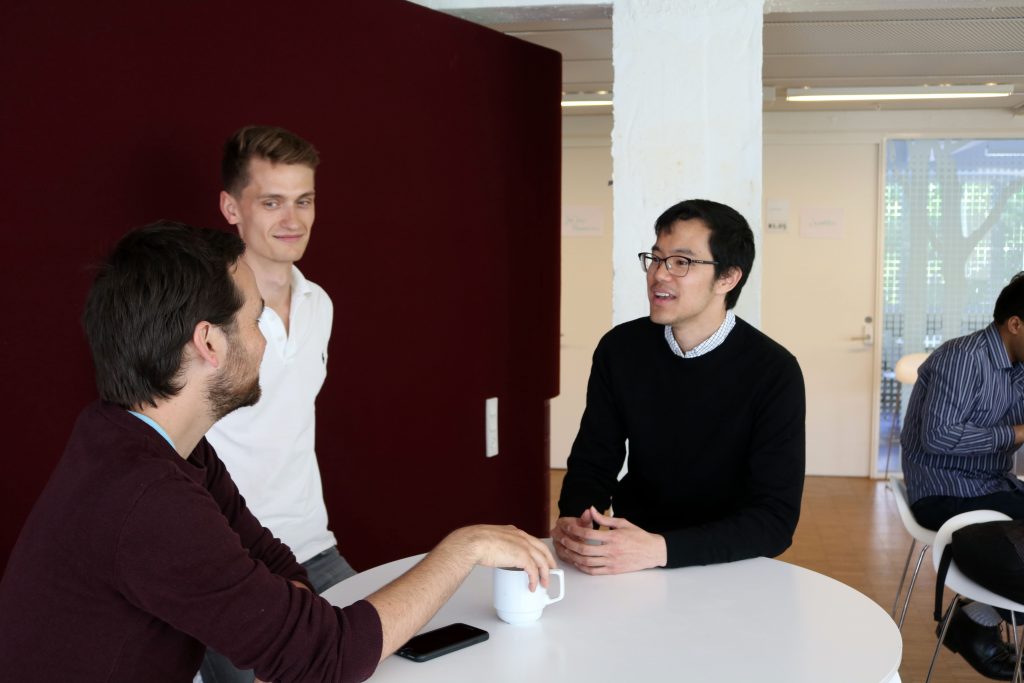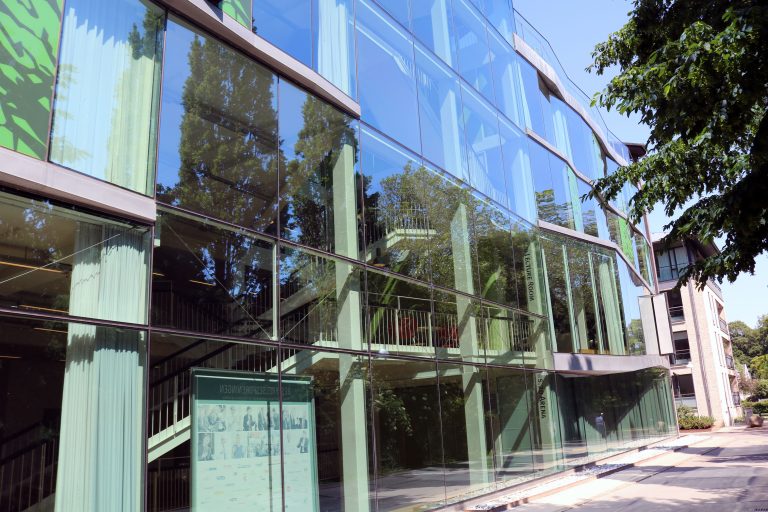Impactful Superstar:
Paul Leung
by Lars Martin Haukohl

As the graduates from Copenhagen Business Schools are finishing up their studies this summer. I took the chance to meet one of them, Paul Leung, to learn more about his career, his vision for a greener future, and why he left Silicon Valley to come to Denmark.

The Copenhagen MBA is especially focused on developing responsible leaders with a strong foundation in sustainable management, as well as all the classic finance, strategy and marketing courses. This focus on sustainability is unique and a key driver for bringing international talents to the program. This not only gives Denmark an influx of brilliant talents, but also an opportunity to help change the world beyond our borders.
This interview, and series, is created in collaboration with CBS MBA.
First off, Hi Paul, who are you and what’s your background?
I’m a US and Hong Kong citizen, so I have two passports, my work experience has mainly been in the San Francisco/Silicon Valley area. And in 2018 I moved to Denmark to pursue an executive MBA at Copenhagen Business School. My background may seem a bit scattered, because on one hand I have the NGO/non-profit background, and I have a financial background from working in accounting.
Through my mixed career, I have really learned how important it is to bring those two together. To bring sustainability and responsible business into the financial world, and bring some smarter financial ideas into the non-profit world. I saw this very much in my last job, where it was a lot of social workers who wanted to make the world a better place for people with disabilities – and that is fantastic – but there were a lot of problems with using the money wisely.
In the financial world, I saw how many people were only focused on making the dollar as soon as possible, and not thinking about the sustainability of that dollar. For example, they were only building affordable housing, because they knew they would get a tax break. Not because they wanted to help the world around them that would ultimately benefit them long term. So I feel there’s a big need for blending these two worlds.

Why did you decide to do the Copenhagen MBA?
It’s been planned for a while that I should do a Masters degree. Having worked in both the US and Asia, I wanted to get a european business perspective. It ended up being between the UK and Denmark, and Copenhagen won out.
What attracted me to Copenhagen – what’s amazing about Copenhagen – is the fact that sustainability is embedded into so much of the city. Both with this MBA program, but also the city. You can take the metro 10 minutes into the city center and go to all sorts of talks, and meet people, who are really into sustainability and are creating sustainable solutions. You get to talk to people who are actually living it right now. That’s what we need, sustainability woven into everything we do, and not pushed off to the side.
Was this sustainability focus something you knew before you came to Copenhagen?
Yes, it was something I knew beforehand, a lot of us knew beforehand. A lot of us are coming here because we want to work for Ørsted or Ramboll or these companies that are being frontiersmen/women in the sustainability world. Personally, I had been to Copenhagen before joining the program, so I knew how easy it is to become part of the sustainability community.
Many of my classmates, knew this was a thing, but not how big of a thing it really is until they arrived and started looking on facebook and eventbrite and saw all these events going on in the city.
How did you end up in the non-profit / sustainability world?
It just sort of happened, it fell in my lap. A thing we learn at the business program is that you to be a good business person, you have to grab the opportunity when they come your way. And my road into the non-profit world was one of those. Through volunteering, I got into that world and landed a non-profit world after my graduation from UC Berkeley.
Another thing that brought me in was the mission statements, it’s something that I really love about that world. How important it is to have a purpose in what you are doing. Knowing that what you are doing is having a positive impact on the world, or in your community.
I’ve been very lucky to get a purposeful job right away, where others have to spend years on learning, and pursuing. And I think there is something very important about that. There are so many great skills and experiences that you can bring into the non-profit world, don’t forget that.
That’s a great point! I use to look back at my own career and think, wow, that was a bit of a waste of time. But, you’re right, I’ve really learned all my skills in those years. Skills that have made me able to build Impactful Jobs, and the indignation to push me through it – so yes, you have to embrace all your steps along the way. That’s also what gives you opportunities in the future.

How was the MBA program? Did it live up to your expectations in regards to the sustainability focus?
The first class we had was a “management of sustainability enterprises”-class, and it’s really interesting how that set the stage for the rest of the program. Even now, at the last class, we are talking about building sustainability into entrepreneurship, that’s what some of the people are working on right now.
Also, during the class about mergers and acquisitions, the focus was to learn about maximizing profits – but it’s not all about that – what about long term stability? how are we contributing to society? These conversations have taken place during the whole year.
I wish we had had more classes on sustainability, but because we got a good foundation at the beginning, we have kept it all along, and it will definitely continue past the MBA program. But I’m also the Impact-guy, I love this stuff.
Another important part of my experience at CBS has been the opportunity to meet so many different people, that I would never overwise have met. People from the mining industry for example who are definitely sustainability focussed, but come from a very different industry. They can really do a lot of good.
In my view, companies are very much deemed sustainable by the products they produce. But we need to understand that it’s equally important how you produce the product. You can produce something that doesn’t mean much, like a t-shirt, but then how are you producing it? Did you grow the cotton in Uzbekistan where there is a drought and you are taking up all the water?
I couldn’t agree more, I see a big tendency towards us actually consuming more stuff, but with a false clean conscious because it’s branded sustainable or “green”. When in fact we are just continuing our old ways, and still hurting the environment heavily.
Right, there’s a lot of talk about going vegan, in order to lower your footprint, but they’re also part of the meat producing that we need – to some extent. The grazing animals are needed to control pastures, where ecosystems rely on them. So I’ve learned that the green transition is so much more complex and interconnected than I thought. Weirdly the program has taught me how sustainability is found outside the MBA classes.



And now what? what are your plans going forward?
I’m looking a lot into jobs within ethics and reporting, promoting transparency – kind of jobs. Where I can leverage my background in sustainability and finance, and help to create that meeting ground between the two.
I would like to do that in Denmark, there’s a lot that the world can learn from Denmark – and vice versa. I think it would be great for me to learn about these ideas in Denmark, really immerse my self in them for a few years, and then hopefully bring them back to Hongkong or the US.
What would you like to change in your field?
I think there’s a big need for interpretation in the finance world. It’s a very exact world, where 1 dollar equals 1 dollar, and if it doesn’t, you can’t count it. A lot of sustainability metrics are very intangible. I think it will be interesting to see how the financial world deals with these metrics going forward. How do we account for sustainability, not just as a marketing tool, not just because you want to make the world better, but as part of the business strategy and how the dollars are made. That interpretation is definitely something that I want to contribute to.
It’s going to be very interesting to se the full impact of sustainability on the financial world, and how do we use those insights to build a stronger case for sustainability.
Let’s make that the last word of this talk, I think we can all agree on the need for always building a stronger case for sustainability. Thank you Paul for the inspiration!
If you are a hungry recruiter, looking for you next leadership talent, take a look at the Copenhagen MBA CV book below: